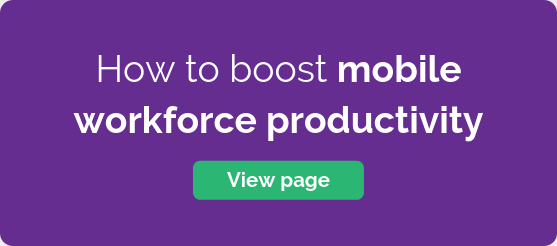
When you’re managing a business that provides mobile goods or services - things will occasionally get messy. It’s just the nature of the beast and there’s no amount of planning or scheduling that can prevent some bad stuff from happening.
And the effectiveness of your company depends on how well you can cope with the various curveballs you find yourself facing - the last minute cancellations, the deliveries that go missing and those everyday mix-ups.
Without a robust setup, any kind of disruption to your work routine is liable to cause havoc - to disrupt schedules, to hammer mobile workforce productivity and create general organisational stress and chaos. So you don’t want that.
You want to create a well-organised business with the flexibility to roll with the punches - a robust framework which keeps things running smoothly no matter how messy things get.
The best ways to organise mobile workers:
- Less can be more
- Update your tools
- Communications is key
- Prepare for bad stuff
- Manage motivation levels
Less can be more
When things get stressful and you don’t feel properly in control, the natural reaction for a manager is to do more managing. You try to hunt down problems and find fixes; you call meetings and create additional schedules, lists and plans.
But this kind of firefighting approach is often more about covering up the underlying cracks rather than tackling them. The more micromanagement that starts to be required, the less flexible an organisation becomes.
Instead, you need to find working systems which allow a less top-down interference. It’s giving workers more control, something that requires a fundamental review of the way your organisation operates.
Update your tools
How well you’re able to respond to problems depends on the speed of communications within your business. If the first you know about a problem is when you have a customer or client raging on a phone to your customer services team - it’s already too late.
It’s the reason why any management processes that still rely on paperwork are ineffective and outdated when compared to digital systems. It’s the difference in organisational agility between an oil tanker and a speed boat.
The advantage of a digital management system is that it allows you to identify issues instantly and tackle them before they become resource sapping problems. It does this by removing the information lag that’s caused by a reliance on paper-based ways of working.
Communications is key
The biggest organisational challenge is communication when attempting to organise mobile workers. It’s how you let everyone know what’s happening when your team spends so much of its time out on the road.
It requires a much more pro-active approach to communications, finding ways to build it into the everyday work routine. It could be sending out a weekly email or schedule regular team meetings.
There are also a growing number of apps designed to improve communications amongst mobile workers, such as Facebook at Work, Slack and Yammer.
Prepare for bad stuff
The worst time to find out whether your organisation can handle a particular situation or not is…when it happens. While you can never plan for every eventuality, you can put together a plan for potential problems.
It’s a case of putting on your paranoid hat on and considering various ‘what if..?’ worst case scenarios. It’s an effective way to draw up contingency plans and to test out different responses.
But it’s also an effective way to identify any weaknesses in your organisation - to find those areas where you’re most likely to struggle when things get wobbly.
Manage motivation levels
Being a mobile worker is tough and as the pace of business life accelerates, it’s getting tougher. Employees are having to meet tight daily deadlines while handling the vagaries of our roads and the rising expectations of clients.
So mobile workers are particularly susceptible to feeling tired, stressed and massively demotivated. And the negative effects will ripple throughout your organisation - from customer complaints to increased sickness and absenteeism.
For an effective organisation, you need to be able to monitor these attitudes and find ways to maintain good morale throughout your workforce. It could be a system of bonuses and rewards or it could be as simple as letting employees know that they’re appreciated.
Applying these tips will help to organise mobile workers. Also, to highlight the differences between digital software and paper, take a look at a day in the life of a mobile worker: showing how digital technology can improve the organisational skills, productivity and efficiency of your business.

.png?width=1161&height=159&name=Asolvi-hex-logos-2023-baseline-final-BA_MyMobileWorkers%20(1).png)
